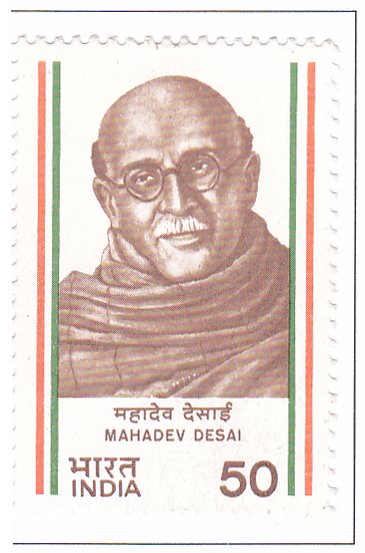Mahadev Desai (1892-1942)

Technical Data
| Stamp Set | India's Struggle for Freedom |
|---|---|
| Date of Issue | August 9, 1983 |
| Denomination | 50 p |
| Quantity | 1,500,000 |
| Perforation | comb 13 |
| Printer | Security Printing Press, Nashik |
| Watermark | No Watermark |
| Colors | Multicolor |
| Catalog Codes |
Michel IN 957 Stamp Number IN 1024 Yvert et Tellier IN 768 Stanley Gibbons IN 1090 |
| Themes | Authors | Famous people | Independency Activists | Literary People (Poets and Writers) | Literature | Men | Optical Instruments |
Mahadev Desai, born on January 1, 1892, in Saras, Surat district, was a pivotal figure in India’s freedom struggle. His educational journey took him through various locations in Gujarat, culminating in his graduation from Elphinston College, Bombay, in 1910. Subsequently, he pursued law at Law College, obtaining his L.L.B. in 1913.
Desai’s life took a transformative turn when he met Mahatma Gandhi on August 31, 1917. Recognizing Gandhi as his spiritual mentor, Desai became inseparable from him, shadowing his every move until Gandhi’s passing. He actively participated in significant events of the freedom struggle, including the Champaran Satyagraha (1917), the Bardoli Satyagraha (1928), and the Salt Satyagraha (1930), courting arrest alongside Gandhi.
In 1921, Gandhi entrusted Desai with the responsibility of editing Motilal Nehru’s periodical, the Independent, in Allahabad. However, Desai’s activism led to his arrest and imprisonment even during this period. Upon his release in January 1923, he returned to Ahmedabad and took charge of the editorial work at Navjivan.
Desai’s sharp editorials vehemently criticized the hollow nature of the constitutional reforms of 1919 and denounced the British government, thereby sustaining the momentum of the freedom struggle. He extensively toured the country with Gandhi between 1924 and 1928, elucidating the key aspects of the struggle for independence.
Accompanying Gandhi to the Round Table Conference in London in 1931, Desai played a crucial role in representing the Indian perspective on the global stage. Tragically, during the Quit India Movement in 1942, both Desai and Gandhi were arrested and detained at the Aga Khan Palace. Desai passed away peacefully on August 15, 1942, deeply mourned by the nation and particularly by Gandhi, who considered him akin to a son.
